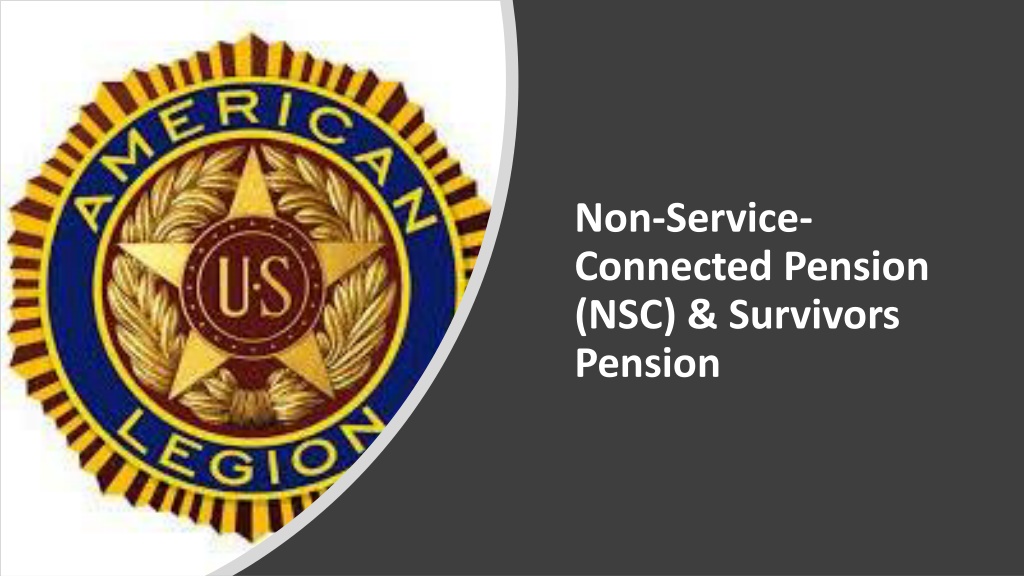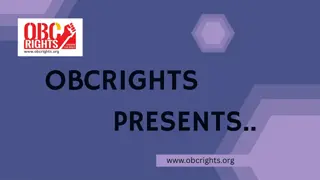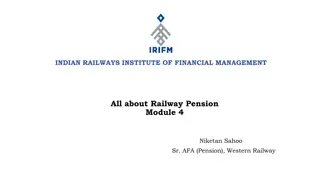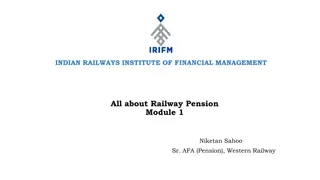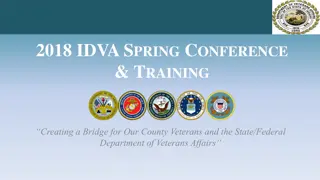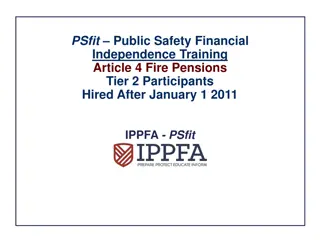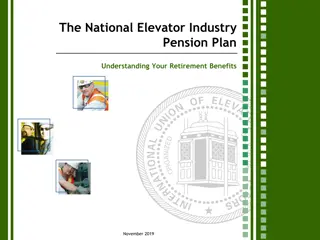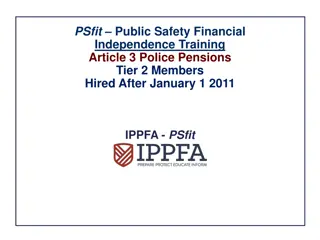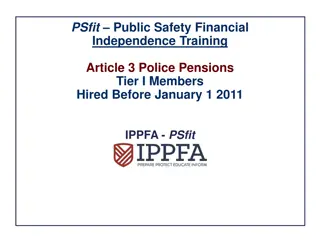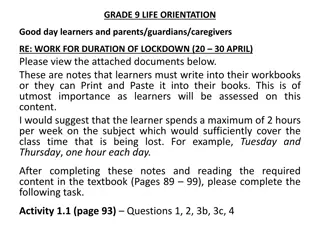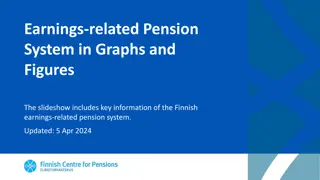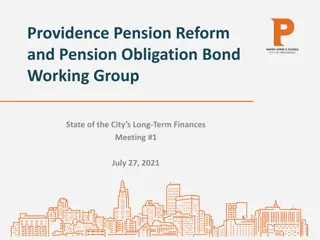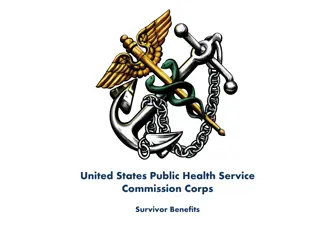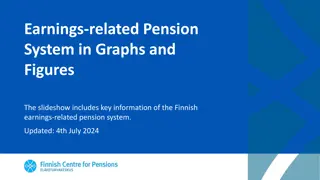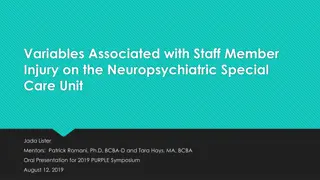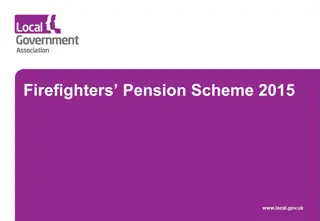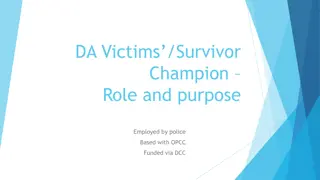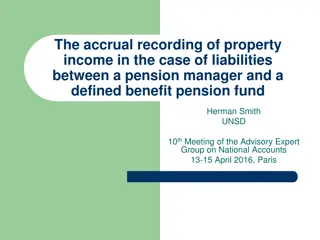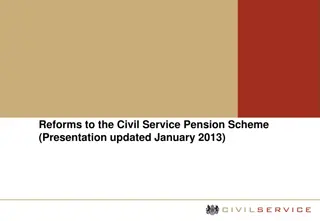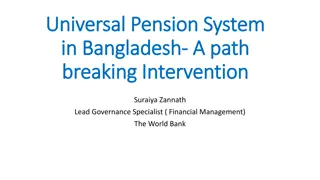Understanding Non-Service-Connected Pension (NSC) and Survivor's Pension
The Non-Service-Connected Pension (NSC) and Survivor's Pension are benefits available to Veterans who meet specific requirements such as honorable discharge, minimum service time during wartime, limited income, and certain disabilities. The NSC pension guarantees an annual income, and additional benefits are provided for housebound or those in need of regular aid. To qualify, veterans must meet conditions related to military service, financial need, and current health status.
Download Presentation

Please find below an Image/Link to download the presentation.
The content on the website is provided AS IS for your information and personal use only. It may not be sold, licensed, or shared on other websites without obtaining consent from the author. Download presentation by click this link. If you encounter any issues during the download, it is possible that the publisher has removed the file from their server.
E N D
Presentation Transcript
Non-Service- Connected Pension (NSC) & Survivors Pension
Identify the elements for entitlement to a non-service- connected pension Recognize the current condition requirements for a non-service-connected pension Recognize the service requirements for a nonservice- connected pension Recognize the financial requirements for a nonservice- connected pension Recognize the requirements for survivor's pension 2
Eligibility for Non-Service Connected Pension The improved pension program is for Veterans who served during a wartime period and meet specific requirements. The following requirements must be meet for the Veteran to receive NSC pension: The Veteran must have been discharge "under other than dishonorable conditions" also known as a "honorable discharge", Served a minimum of one day during wartime, period Meet specific service time requirements, 90 days or more of active duty Veterans with active duty enlistment after September 7, 1980 must serve at least 24 months of active duty or complete the full period for which they were called to active duty. Be of limited income (determined by the Maximum Annual Pension Rate or MARP) and net-worth, which are discussed later in this PowerPoint The Veteran must have one or more of the following : age 65 or older, or have a permanent and total non-service connected disability that will continue throughout the Veteran's lifetime and prevents the Veteran from sustaining employment, or reside in a nursing home for long-term care , or be a recipient of Social Security disability benefits. 3
Non Non- -Service Service- -Connected Disability Connected Disability Pension Pension NSC Pension is a benefit that guarantees an annual income of $13,752 for a single Veteran Amount paid is the difference between the Veteran s actual income and $13,166, with a dollar for dollar offset from other income Amount paid increases with dependents NSC Pension can be increased if the Veteran is: Housebound (single rate, $16,805) or In need of regular aid and attendance (single rate, $22,939) Rate on 12/1/2019: https://www.benefits.va.gov/pension/current_rates_veteran_pen.asp 4
Requirements There are 3 major sets of requirements for NSC pension: Current condition Military service Financial need All 3 requirements must be met 5
Current Condition Current Condition A current condition can be any one of the following: Totally and permanently disabled according to VA, or Declared totally disabled by SSA, or A patient in a nursing home, or 65 years of age or older 6
Military Service Military Service Eligible Wartime Periods Eligible Wartime Periods World War II Korean conflict Vietnam era (February 28, 1961 May 7, 1975 for Veterans who served in the Republic of Vietnam during that period; otherwise August 5, 1964 May 7, 1975) Gulf War (August 2, 1990 through a future date to be set by law or Presidential Proclamation) 7 Dec. 1941 31 Dec. 1946 27 June 1950 31 Jan. 1955 28 Feb. 1961 7 May 1975 2 Aug. 1990 7
Financial Need: Net Financial Need: Net Worth Worth Amount varies based upon claimant's life expectancy Does not count home or personal items such as furniture or car Liquid assets must be under $129,094 Transfer assets to meet the net worth requirement may not be recognized if made to family member or appears to be an attempt to hide assets Pending regulation change would create presumption of invalid transfer and a three-year look back 8 80 Fed. Reg. 3,839 (Jan. 23, 2015) (amending 38 C.F.R. 3.276)
Financial Need: Countable Income Financial Need: Countable Income Report all income VA checks other agencies Or the Veteran risks creating an overpayment Income deductions include: Non-reimbursed medical expenses of family members, and Veterans All assisted living expenses If the facility provides medical or nursing services for the disabled person Fees paid for an in-home attendant If the attendant provides medical or nursing services for the disabled person
This VA benefit works much like the nonservice-connected pension benefit The Veteran s surviving spouse does not need to be disabled VA ensures the surviving spouse of a deceased, honorably discharged, wartime Veteran a minimum annual income ($9,224) Housebound rate: $11,273 A&A rate: $14,742 VA increases the benefit based on the number of dependent surviving children (up to the age of 24 has long as they are in school) NSC Survivor NSC Survivor Pension Pension Benefits Benefits Note: Rate Current as of December 1st, 2017 10
Dependency and Indemnity Compensation (DIC) is a tax free monetary benefit paid to eligible survivors of military Servicemembers who died in the line of duty or eligible survivors of Veterans whose death resulted from a service-related injury or disease. Eligibility (Surviving Spouse) Eligibility (Surviving Spouse) To qualify for DIC, a surviving spouse must meet the requirements below. The surviving spouse was: -- Married to a Servicemember who died on active duty, active duty for training, or inactive duty training ,OR ,OR -- Validly married the Veteran before January 1, 1957, OR Compensation Dependency and Indemnity Compensation OR -- Married the Veteran within 15 years of discharge from the period of military service in which the disease or injury that caused the Veteran's death -- began or was aggravated, OR OR -- Was married to the Veteran for at least one year, OR OR -- Had a child with the Veteran, AND AND -- Cohabited with the Veteran continuously until the Veteran's death or, if separated, was not at fault for the separation, AND AND -- Is not currently remarried Note Note: A surviving spouse who remarries on or after December 16, 2003, and on or after attaining age 57, is entitled to continue to receive DIC
Eligibility (Surviving Child) Not included on the surviving spouse's DIC, AND Unmarried, AND Under age 18, or between the ages of 18 and 23 and attending school. Note: A child adopted out of the Veteran s family may be eligible for DIC if all other eligibility criteria are met. Evidence Required Listed below are the evidence requirements for this benefit: The Servicemember died while on active duty, active duty for training, or inactive duty training, OR The Veteran died from an injury or disease deemed to be related to military service, OR The Veteran died from a non service-related injury or disease, but was receiving, OR was entitled to receive, VA Compensation for service-connected disability that was rated as totally disabling For at least 10 years immediately before death, OR Since the Veteran's release from active duty and for at least five years immediately preceding death, OR For at least one year before death if the Veteran was a former prisoner of war who died after September 30, 1999
Evidence Required Listed below are the evidence requirements for DIC: The Servicemember died while on active duty, active duty for training, or inactive duty training, OR The Veteran died from an injury or disease deemed to be related to military service, OR The Veteran died from a non service-related injury or disease, but was receiving, OR was entitled to receive, VA Compensation for service-connected disability that was rated as totally disabling For at least 10 years immediately before death, OR Since the Veteran's release from active duty and for at least five years immediately preceding death, OR For at least one year before death if the Veteran was a former prisoner of war who died after September 30, 1999
How to Apply Complete VA Form 21P-534ez, "Application for Dependency and Indemnity Compensation, Death Pension and/or Accrued Benefits by a Surviving Spouse or Child and mail to the Pension Management Center that serves your state, OR Work with an accredited representative or agent OR Go to a VA regional office and have a VA employee assist you. You can find your regional office on our Facility Locator page OR If the death was in service, your Military Casualty Assistance Officer will assist you in completing VA Form 21P-534a, " Application for Dependency and Indemnity Compensation, Death Pension and/or Accrued Benefits by a Surviving Spouse or Child" and mail to the Philadelphia Regional Office For more information on how to apply and for tips on making sure your claim is ready to be processed by VA, visit our How to Apply page.
Aid & Attendance and Housebound Veterans and survivors who are eligible for a VA pension and require the aid and attendance of another person, or are housebound, may be eligible for additional monetary payment. These benefits are paid in addition to monthly pension, and they are not paid without eligibility to Pension. Since Aid and Attendance and Housebound allowances increase the pension amount, people who are not eligible for a basic pension due to excessive income may be eligible for pension at these increased rates. A Veteran or surviving spouse may not receive Aid and Attendance benefits and Housebound benefits at the same time. *Not only limited to NSC Pension Veterans receiving VA Compensation can apply for A&A or Housebound
Aid & Attendance (A&A) The Aid & Attendance (A&A) increased monthly pension amount may be added to your monthly pension amount if you meet one of the following conditions: You require the aid of another person in order to perform personal functions required in everyday living, such as bathing, feeding, dressing, attending to the wants of nature, adjusting prosthetic devices, or protecting yourself from the hazards of your daily environment You are bedridden, in that your disability or disabilities requires that you remain in bed apart from any prescribed course of convalescence or treatment You are a patient in a nursing home due to mental or physical incapacity Your eyesight is limited to a corrected 5/200 visual acuity or less in both eyes; or concentric contraction of the visual field to 5 degrees or less
Housebound Housebound This increased monthly pension amount may be added to your monthly pension amount when you are substantially confined to your immediate premises because of permanent disability.
How to Apply How to Apply You may apply for Aid and Attendance or Housebound benefits by writing to the Pension Management Center (PMC) that serves your state. You may also visit your local regional benefit office to file your request. You can locate your local regional benefit office using the VA Facility Locator. You should include copies of any evidence, preferably a report from an attending physician validating the need for Aid and Attendance or Housebound type care. The report should be in sufficient detail to determine whether there is disease or injury producing physical or mental impairment, loss of coordination, or conditions affecting the ability to dress and undress, to feed oneself, to attend to sanitary needs, and to keep oneself ordinarily clean and presentable. Whether the claim is for Aid and Attendance or Housebound, the report should indicate how well the applicant gets around, where the applicant goes, and what he or she is able to do during a typical day. In addition, it is necessary to determine whether the claimant is confined to the home or immediate premises. VAF 21-2680
Questions 19
